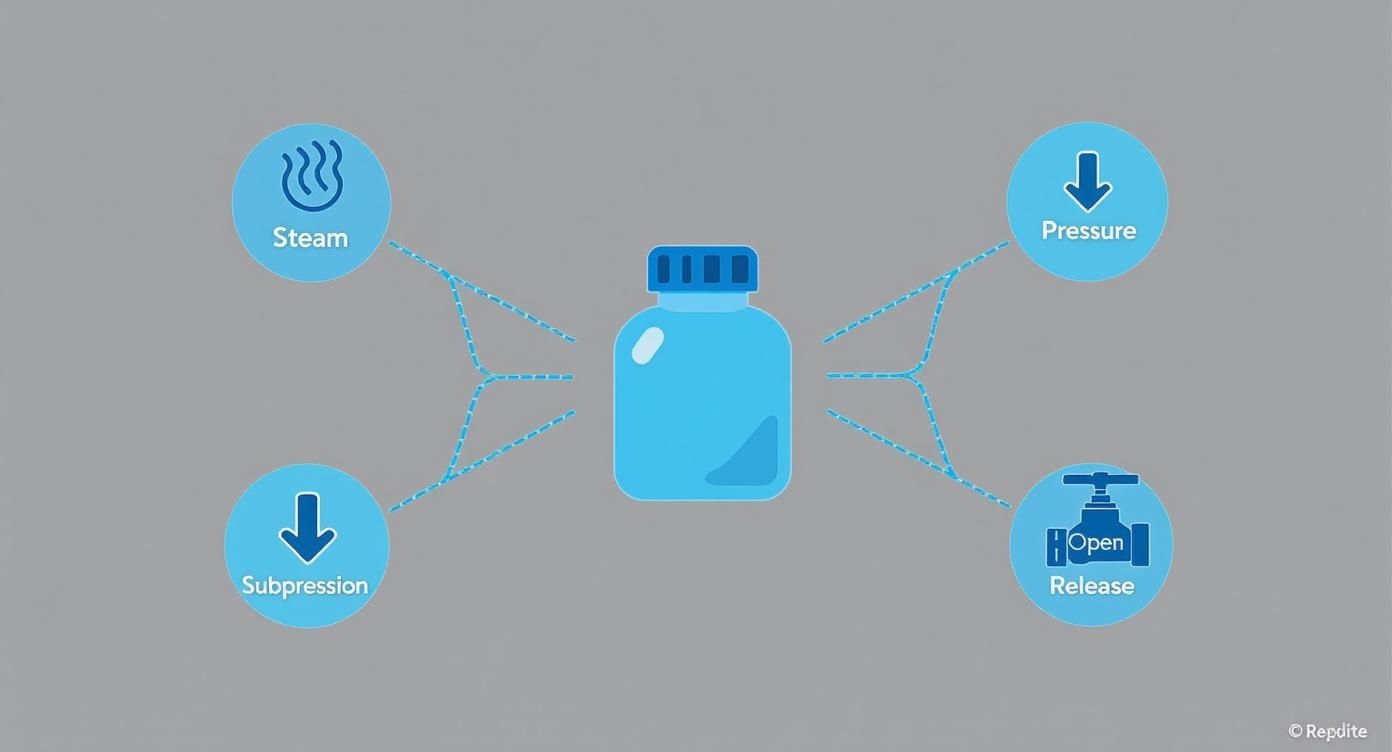Signs and Impacts of Bottled Up Emotions
- Nov 8, 2025
- 14 min read
Updated: Feb 8
When we talk about bottled-up emotions, we’re describing that all-too-common habit of pushing our feelings down instead of facing them. It’s a defence mechanism, often learned in childhood, where we decide it’s safer or easier to ignore difficult emotions to avoid feeling uncomfortable. But just like a bottle under pressure, there’s only so much it can take.
Understanding Bottled Up Emotions
Think of your feelings like water boiling in a kettle. All the little frustrations, disappointments, and things left unsaid slowly crank up the heat. If you keep the lid clamped down, the pressure just builds and builds. That’s the heart of bottled up emotions. It isn’t a sign of weakness; it’s a coping strategy many of us pick up to get through life. Emotional suppression is the act of consciously—or unconsciously—shoving those feelings aside, hoping they’ll just vanish.
Most of the time, this happens without us even realising. Instead of letting ourselves feel sad or angry, we throw ourselves into work, lose ourselves in our phones, or just tell ourselves to “get on with it.” It might feel like it works for a moment, but the original feeling is still there, simmering away. That pressure keeps mounting, and eventually, it has to find a way out, often in ways we least expect.
The infographic below really captures this cycle of building pressure, suppression, and the inevitable need for release.

As the visual shows, that internal pressure from unexpressed feelings leads us to suppress them, but a healthy release is vital to stop things from boiling over. Getting your head around this dynamic is the first step toward finding healthier ways to manage your emotional world.
A Growing Concern in the UK
This internal battle is becoming more and more widespread. Across England, the rates of common mental health conditions have climbed steadily over the last decade, pointing to a real and growing struggle with psychological distress.
A recent survey found that 1 in 5 adults in England now lives with a common mental health condition. That’s up from 1 in 6 back in 2014. These conditions, like anxiety and depression, are very often tangled up with emotions that have been left unsaid. You can explore more about these mental health trends in England to get the full picture.
In this guide, we’ll walk through:
The subtle signs of emotional suppression.
The real impact it has on your mental and physical health.
Practical, safe ways to finally let that pressure go.
My aim here is to offer a clear, supportive way forward, helping you feel seen, understood, and ultimately, hopeful.
Author: Therapy-with-Ben
Why We Learn to Bottle Up Our Feelings

Let's be clear: nobody chooses to start bottling things up out of the blue. It’s a behaviour we learn, often picked up in childhood as a way to protect ourselves. Think of it as an emotional shield, something that helps us get through tricky social situations or deal with feelings that feel too big to handle.
But here’s the problem. What starts as a useful defence mechanism in our youth can harden into a harmful habit as we get older, leaving us feeling disconnected from ourselves and the people around us.
This emotional armour gets built for all sorts of reasons. For many of us, it starts at home. Maybe you grew up with unspoken family rules like "big boys don't cry" or that showing anger was simply not allowed. When expressing yourself is met with disapproval, you quickly learn it's safer to just keep it all inside.
Then there’s the pressure from the wider world. Society still pushes this powerful, persistent message that being "strong" means being stoic and completely unfazed by life's knocks. This is especially true for men, who are often taught from a very young age to hide any sign of vulnerability. Soon enough, these outside messages become our own inner voice, cementing the idea that bottled up emotions are a sign of strength, not a source of stress.
The Roots of Emotional Suppression
Figuring out where this habit comes from is the first real step towards changing it. It helps you look at yourself with a bit of compassion instead of judgement. Those past experiences that made you feel unsafe to be vulnerable were powerful teachers, and they’ve likely shaped how you handle your feelings for years.
So, where does it usually start?
Your Childhood Environment: Growing up in a home where emotions were dismissed, criticised, or even punished.
Societal Expectations: Trying to live up to cultural or gender stereotypes that discourage open emotional expression.
Past Trauma: Going through something where showing vulnerability led to a bad outcome, teaching you that it's dangerous to be open.
Fear of Being a Burden: Worrying that sharing your problems will just overwhelm or inconvenience the people you care about.
Sometimes, bottling things up is part of a bigger pattern, like masking. This is where people hide their natural personality to better fit in. It’s a common experience for neurodivergent individuals, as explained in this excellent guide on masking in autism: A guide to authentic self. This constant performance is a perfect example of how emotional suppression becomes a survival tool.
Realising that you learned to hide your feelings as a way to protect yourself is a crucial insight. It reframes the issue from being a personal failing to being a coping mechanism that may have simply outlived its purpose.
When you start exploring these roots, you can begin to see your emotional patterns not as character flaws, but as adaptations that helped you get by. This self-awareness is the foundation you need to gently lower that old shield and learn healthier, more open ways of dealing with your feelings.
Recognising the Signs of Emotional Suppression

Often, the biggest clue that we have bottled up emotions isn’t a conscious thought at all. It’s a series of subtle changes in our behaviour, our mood, and even our physical health. Think of these signs as warning lights on a car's dashboard—they’re easy to ignore at first, but they signal that something under the surface needs urgent attention.
Learning to spot these indicators is the first real step toward doing something about them. The patterns can be tricky to identify because they often masquerade as something else entirely. That persistent stress or lingering bad mood? It might actually be the fallout from feelings you've been pushing down for weeks, months, or even longer.
This isn't just a personal struggle; it’s a much wider issue. In England, roughly 1 in 4 adults experience a mental health problem each year. Statistics show women often report higher rates (20.7%) than men (13.2%). This is especially true for young women aged 16 to 24, where 28.2% report common mental health disorders, which are frequently tangled up with unexpressed feelings. You can dig deeper into these mental health statistics and their impact to get a clearer picture.
Common Signs of Bottled Up Emotions
Noticing the signs is the first step. They often fall into three main camps: how you act, how you feel, and how your body responds. Below is a breakdown of what to look out for.
Category | Common Signs and Symptoms |
|---|---|
Behavioural | Withdrawing from friends and family; making sarcastic or passive-aggressive comments instead of being direct; using distractions (overworking, drinking, excessive screen time) to avoid feelings; difficulty connecting with others. |
Emotional | Feeling numb or disconnected from your life; sudden, intense emotional outbursts (anger, crying) over minor things; a constant feeling of being 'on edge' or irritable; a general sense of unease or anxiety without a clear cause. |
Physical | Persistent headaches or migraines; digestive issues like IBS, cramps, or indigestion; chronic fatigue that sleep doesn't fix; unexplained aches and pains, especially in the neck, shoulders, and back. |
Recognising yourself in this table isn't a bad thing. It's a sign that you're starting to connect the dots and listen to what your mind and body are trying to tell you.
Behavioural and Emotional Red Flags
When you’re suppressing emotions, the way you act and feel can change dramatically. You might find yourself pulling away from people or finding it harder to connect, even with those you love. This emotional distance is a classic defence mechanism.
Instead of talking about what’s really bothering you, you might find yourself making sarcastic jokes or passive-aggressive remarks. It’s a way of letting a little bit of pressure out of the bottle without having to be truly vulnerable. Others turn to constant distraction—long hours at the office, an extra glass of wine, or endless scrolling online—anything to avoid facing what they truly feel.
One of the most common emotional signs is a feeling of numbness. It’s that strange sense of being disconnected from your own feelings, almost as if you’re watching your life from a distance instead of really living it.
Another huge red flag is having sudden, intense emotional outbursts. If you find yourself snapping in anger over something tiny or bursting into tears for no apparent reason, it’s often because a minor incident has just uncorked a whole backlog of suppressed emotion. Building your ability to notice these inner shifts is a crucial part of personal growth, and learning about self-awareness in counselling can give you the tools to better understand these internal signals.
The Physical Toll of Holding It In
Your body always keeps the score. When emotions are left unexpressed, they create very real physical stress. Holding it all back keeps your body in a low-grade state of fight-or-flight, and that takes a massive toll over time.
This chronic tension can show up in all sorts of ways, and it's vital to see the link between your emotional state and your physical wellbeing. Some of the most common physical symptoms include:
Persistent Headaches: Tension headaches and migraines are very frequently linked to unresolved stress and emotional strain.
Digestive Issues: Problems like irritable bowel syndrome (IBS), stomach cramps, and indigestion can be triggered or worsened by emotional suppression.
Chronic Fatigue: That feeling of being physically and emotionally drained, no matter how much you sleep, is a hallmark of the energy it takes to keep everything bottled up.
Unexplained Aches: You might carry persistent muscle tension, particularly in the neck, shoulders, and back, without any obvious physical cause.
Spotting these patterns is an act of self-care. It allows you to stop seeing these issues as isolated problems and start connecting them back to your emotional health, where they often belong.
The Mental and Physical Toll of Unexpressed Emotions
Keeping your feelings locked away isn’t a passive act. Far from it. It’s a full-time, exhausting job for your mind and body, and the constant effort to push those feelings down creates a state of chronic internal stress. That strain has serious, long-term consequences that ripple through your entire well-being.
Think of your body as having an internal alarm system. When you feel a strong emotion like anger or sadness, that alarm is meant to go off, get your attention, and then switch off once the feeling is acknowledged. But when you constantly bottle things up, it’s like leaving that alarm ringing indefinitely. It keeps your nervous system stuck on high alert.
This sustained “fight-or-flight” mode is physically draining. It can trigger a cascade of very real health problems, from high blood pressure as your heart works overtime, to a weakened immune system that makes you more vulnerable to every bug going around. Your body simply wasn’t built to withstand that level of continuous stress.
How Unexpressed Emotions Affect Your Mental Health
On a psychological level, feelings you don't express don't just vanish. They fester. Sadness that isn't allowed to surface can deepen into clinical depression. Anxieties that are never voiced can spiral into generalised anxiety disorders. It’s a vicious cycle: the energy you spend hiding your feelings leaves you too drained to cope with daily life, paving the way for burnout and complete emotional exhaustion.
The demand for mental health services in England has skyrocketed, painting a clear picture of this growing burden. In a single year, mental health service referrals shot up to a record 5.2 million—a staggering 37.9% increase since 2019. This goes hand-in-hand with a steady rise in common mental disorders, which now affect 22.6% of adults aged 16-64, up from 17.6% in 2007. You can discover more insights about these mental health pressures and see for yourself just how much support is needed.
Constantly holding back your feelings is like trying to hold a beach ball underwater. It takes a huge amount of effort, and eventually, it’s going to pop up with force when you least expect it.
This emotional pressure often shows up in ways that damage our mental state, such as:
Increased Irritability: Small frustrations can trigger huge reactions because they’re tapping into a deep reservoir of unexpressed anger.
Emotional Numbness: As a defence mechanism, your mind might start to dull all your emotions, leaving you feeling disconnected, flat, and empty.
Difficulty in Relationships: Hiding how you truly feel creates an invisible wall between you and others, making genuine connection and intimacy feel almost impossible.
The Physical Weight of Your Feelings
The mind-body connection isn't just a trendy phrase; it's a powerful reality. Unexpressed emotions very often surface as physical ailments. The chronic stress of keeping everything inside floods your body with cortisol, the main stress hormone, which can disrupt nearly all of your body's systems.
This can directly contribute to a whole host of physical health issues:
Cardiovascular Strain: Long-term emotional stress is a well-known risk factor for high blood pressure and heart problems.
Digestive Upset: The gut is incredibly sensitive to stress. Suppressed emotions are frequently linked to conditions like Irritable Bowel Syndrome (IBS), indigestion, and stomach cramps.
Chronic Pain and Tension: Unresolved feelings often get stored in the body as physical tension, leading to persistent headaches, migraines, and those all-too-common unexplained aches in the neck, shoulders, and back.
Realising that your feelings have a physical weight is a game-changer. Learning to release what you’ve bottled up isn’t just about feeling better mentally; it's a vital practice for protecting your long-term physical health, too.
Practical Strategies to Safely Release Your Emotions

Knowing the damage that bottled-up emotions can do is the first step. But the real work—the bit that changes things—is learning how to let them go safely. This isn’t about having a massive, dramatic outburst. It’s about building small, consistent habits that let you process what you’re feeling in a healthy, manageable way.
Think of it like gently turning the valve on a pressure cooker rather than waiting for the whole thing to blow.
These strategies are tools you can start using today. They create a safe container for your feelings, giving you the space to look at them without getting swept away. You're essentially building a new emotional toolkit, one practical skill at a time.
The Power of Naming Your Feelings
Often, the most powerful first step is also the simplest. It’s a technique sometimes called ‘Name It to Tame It’, and it does exactly what it says on the tin. The simple act of putting a label on what you're feeling can take the wind out of its sails.
When an emotion is just a confusing, overwhelming storm inside, it feels immense. But when you can stop and say, "Okay, I am feeling resentful," or "This is grief," you start to regain a sense of control.
Journaling is a brilliant way to practise this. You don’t need to write a literary masterpiece. Just jotting down a few sentences about your day and how things made you feel can be incredibly revealing. It’s a private chat with yourself where you can be totally honest, with zero judgement. This is a core part of learning what emotional regulation is and how to master it.
By simply acknowledging and labelling an emotion, you move it from the reactive, primal part of your brain to the more logical, thinking part. This shift is often enough to dial down the emotional volume and give you room to breathe.
Physical and Creative Outlets
Emotions aren’t just in your head; they are a very real energy that gets stored in your body. Sometimes, the best way to get that energy out is to get physical. It doesn't need to be anything fancy.
Here are a few ways to physically process feelings:
Intense Exercise: A brisk walk, a run, or a heart-pumping workout can be a fantastic release for frustration or anger.
Private Expression: Find a private space—your car, a room when no one's home—and shout into a pillow. Or just let yourself have a proper cry without holding back.
Creative Pursuits: Channelling those intense feelings into something creative like painting, playing an instrument, or even just scribbling can turn difficult emotions into something tangible and meaningful.
You might also find that creating a calming atmosphere helps. For instance, exploring how candles can influence your mood and emotions can offer a sensory route to making space for reflection.
Starting a Conversation and Seeking Support
While working on your own is vital, we’re built for connection. Learning to share what you’re feeling with someone you trust is a game-changing skill. It can feel massive, I know, so start small.
Pick one person—a partner, a close friend, a family member—and find a time when you won’t be rushed or interrupted.
You could start with something simple like, “I’ve been feeling a bit overwhelmed lately, could I talk to you about it?” This gives them a heads-up and lets them know you need them to listen, not to fix anything. Often, just being heard without judgement is all we need.
If the thought of talking to a friend feels impossible, that’s a clear sign that professional support could be a huge help. A therapist provides a safe, confidential space designed specifically for these conversations. My walk-and-talk therapy sessions in Cheltenham, for example, offer a less formal setting that can make opening up feel much more natural and less intimidating.
Your Path to Emotional Freedom
The journey to finally processing your bottled-up emotions isn't a sign of weakness; it’s an act of profound strength. Simply acknowledging what you feel is a vital first step towards living a healthier, more fulfilling life.
As we've explored, learning to express your feelings is a skill. It's something you can build over time, with a good dose of patience and self-compassion.
This path isn’t about trying to get rid of difficult feelings. Instead, it’s about learning to listen to what they're trying to tell you. Every small step you take—whether it's scribbling in a journal, opening up to a friend, or just putting a name to an emotion—helps you build real, lasting mental fortitude.
If it all feels a bit overwhelming, remember that reaching out for professional support is a positive, proactive step towards your own wellbeing. Therapy offers a safe, non-judgemental space to unpack your feelings and learn new ways of coping. It’s a powerful way to build your emotional resilience and thrive in every area of your life.
Author: Therapy-with-Ben
Still Got Questions?
We’ve covered a lot of ground on the signs, impacts, and ways to manage bottled up emotions, but it's completely normal to have a few more practical things on your mind. Here are some of the most common questions I get asked, with answers to help you feel more confident about taking that next step.
Is It Really Always Bad to Bottle Things Up?
Look, sometimes life demands it. If you’re in the middle of a big work presentation or dealing with a family emergency, it’s not the time to fall apart. Pushing a powerful emotion aside for a short while can be a practical coping skill.
But here’s the crucial bit: it has to be a temporary measure, not a permanent filing system. The trick is to consciously tell yourself, "Okay, I can't deal with this right now, but I will come back to it later." It’s the chronic, long-term suppression—where feelings are just shoved down day after day—that really starts to cause damage to your mental and physical health.
What If I Start Crying When I Finally Talk?
That’s okay. In fact, it’s more than okay. Crying is a natural, healthy physical release. Think of it as a pressure valve finally letting go. It’s not weakness; it’s your body’s way of processing all the sadness, frustration, or even relief that’s been stuck inside for so long.
If the thought of crying in front of someone is holding you back, start with a person you trust completely, someone who won’t judge you. Or, consider talking to a therapist. A therapist’s office is a space designed specifically for this – a safe container for you to let go without fear.
I've Never Talked About My Feelings. How on Earth Do I Start?
You don’t have to start by spilling your deepest, darkest secrets. Think of it like building a muscle you’ve never used before – you start with small weights.
Try sharing something minor with a partner or a close friend. Something as simple as, “I had a really frustrating moment at work today, have you got a minute?” can be a great starting point. Each time you do it, that muscle for emotional expression gets a little bit stronger.
Journaling is another brilliant way to get started. It’s like a rehearsal – you get to practise putting feelings into words in a private space, with absolutely no pressure.
Interested in exploring therapy further? Learn more about my walk-and-talk therapy in Cheltenham , see my counselling fees, or discover how therapy can help you. If you’d like to know more about my background, visit the about me page. Ready to take the next step? Contact me to arrange a first session or ask any questions.
At Therapy with Ben, I offer a safe, supportive space to start unpacking these feelings, whether that’s in a traditional therapy room or out in the fresh air on a walk-and-talk session in Cheltenham. If you feel ready to start your journey towards emotional freedom, you can learn more at https://www.therapy-with-ben.co.uk.



Comments